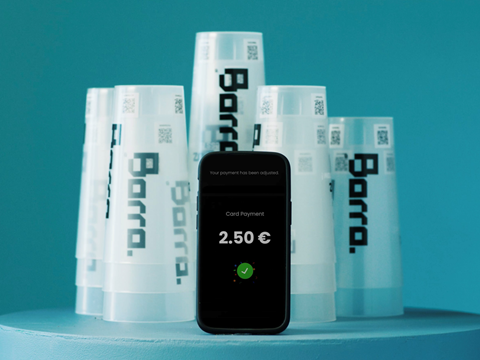
Borro has developed a ‘frictionless’ reuse system for beverage cups served at events; its app-free, QR-driven return process is thought to be ‘as easy as single-use’ and aims to improve return rates and consumer satisfaction.
When consumers purchase a beverage under the Borro1 system, they pay for both the drink and a deposit for the reusable cup. The server scans the QR code on the cup to link the cup to the consumer’s payment card.
Once empty, the buyer must return the cup (or multiple cups in one transaction) to a self-service collection point. The QR code is automatically scanned, the return is automatically processed, and the consumer’s deposit is returned. The refund can be directed to the consumer’s bank account, or to designated cards or bracelets used for the event.
Borro claims to have developed a simpler, less expensive, and less time-consuming system. Since no technology or apps are required, it is expected to avoid long queues and downloads. In turn, it is set to simplify logistics and relieve the burden on venue staff to help operate the return process.
Additionally, it is anticipated that transaction costs will be lowered by eliminating extra refund fees, and that the solution will prevent fraud, theft, and visitors to a venue profiting from deposits.
Since Borro is a digital solution, it can reportedly be applied to any packaging supplier. Nevertheless, the company adds that it “collaborate[s] with several trusted partners and can recommend and facilitate packaging solutions to suit your needs.” It is also said to integrate ‘seamlessly’ into existing closed-loop systems.
“We understand the challenge of switching to reusable packaging – both operationally and financially,” the company says on its website. “Our mission is to offer a solution that’s as easy as single-use while having a lower impact on the environment.
“We’re proud to partner with leading brands like Deliveroo and major event venues. Let’s work together to make your switch to reuse as smooth as possible.”
A LinkedIn post from co-founder Glenn Verhaege continues: “What started with a pilot at RSC Anderlecht, followed by tests at Club Brugge and FC Utrecht, has grown into a working system, ready to scale.
“Our goal has always been clear: make reuse as simple as single use. No apps. No over-engineered tech. No cups full of chips. Technology should never be the point, only the enabler.
“We’ve proven it works, now it’s time to grow. In the coming months, we’re going live at multiple locations across Europe.”
Borro emphasizes that it is always looking for new partners – cup producers, payment providers, point-of-sale systems, and logistics experts, to name a few – to create a connected chain and improve reuse at scale.
In other news, the municipality of Aarhus, Denmark, has teamed up with TOMRA to pilot the ‘world’s first’ open-managed system for reusable takeaway packaging in a three-year project. A shared infrastructure of automated collection points has been installed throughout the city; these can be accessed 24/7 in order to return used packaging, with the solution hoped to assist in reducing single-use packaging on a city-wide scale.
After one year of the trial, a survey of Aarhus residents conducted by Aarhus Municipality and Epinion indicates that the majority of users are satisfied with the system overall. Some suggested that, to improve the system, more collection machines should be installed closer to or at all establishments where the reusable cups are sold.
Another reuse system utilizing QR technology is Polytag, with its Digital Link QR code now featured on Ocado Retail’s reusable packaging to walk consumers through the refill and return process under its digital deposit return scheme. Over sixty food, drink, and household product ranges can now be scanned with a smartphone to access instructions – a move hoped to help reduce single-use plastic waste by boosting reuse behaviours.
Meanwhile, the Petaluma Reusable Cup Project – featuring big brands like The Coca-Cola Company, Starbucks, and PepsiCo – reported a 51% return rate after over thirty restaurants served drinks in reusable cups as the default during a city-wide trial. This process sought to increase the accessibility and inclusivity of reusable packaging solutions, instill reuse habits among consumers, and eliminate ‘hundreds of thousands’ of single-use cups.
If you liked this story, you might also enjoy:
The ultimate guide to the Packaging and Packaging Waste Regulation in 2025
How are the top brands progressing on packaging sustainability?
Everything you need to know about global packaging sustainability regulation in 2025
The key to increasing the use of reusable packaging in supermarkets













No comments yet